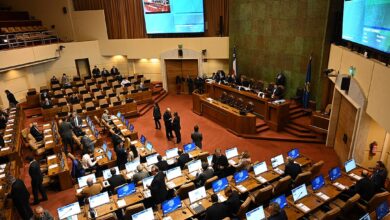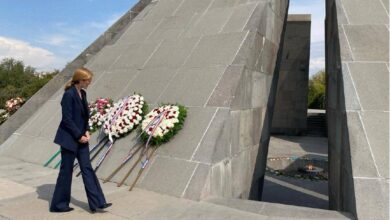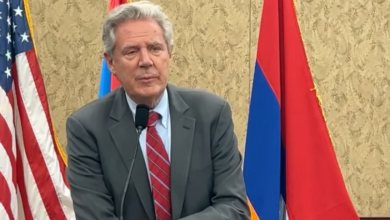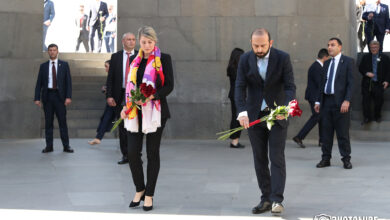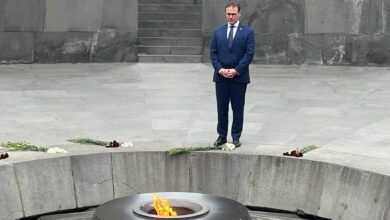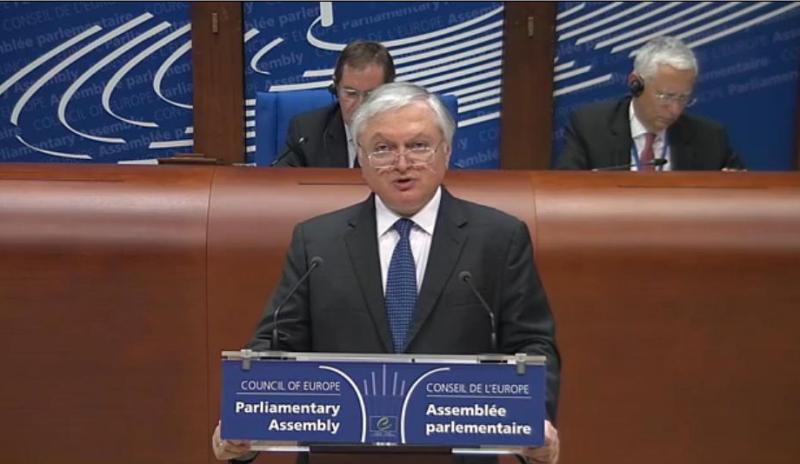
Armenian Foreign Minister, Chairman of the Committee of Ministers of the Council of Europe Edward Nalbandian made a speech at the autumn session of the Parliamentary Assembly of the Council of Europe. The full text of the speech is provided belowe:
Distinguished President Mignon,
Distinguished members of the Parliamentary Assembly,
Ladies and gentlemen,
President Mignon, thank you for the warm welcome,
I am pleased to address once again this Assembly in my capacity as a Chairman of the Committee of Ministers. You have already received the written activity report of the Armenian Chairmanship on the progress achieved over recent months. However, I would, like to take this opportunity to highlight a few important developments.
Sixty years ago, on 3 September 1953, the Convention for the Protection of Human Rights and Fundamental Freedoms, entered into force. I stressed in my previous communication that this treaty was undoubtedly the cornerstone for the protection of human rights in Europe. Over sixty years, persons within the jurisdiction of the member States of the Council of Europe have benefited from this unique legal instrument. Since 1953, the European Court on Human Rights has delivered approximately 16,500 judgments and over 500,000 applications have been dealt with under the European Convention on Human Rights. Several landmark judgments of the Court have helped to significantly strengthen the rule of law and democracy across the European continent.
The promotion of human rights is an ongoing process and it is our common responsibility to ensure that the European Convention remains an effective instrument of European public order that it has become over the years. I am convinced that the Committee of Ministers of the Council of Europe should and will continue to do its utmost to ensure that the rights enshrined in the Convention are respected and protected across Europe.
The consolidation of the Council of Europe system of human rights protection is becoming a topic of great importance and that is a reason why the Armenian Chairmanship of the Committee of Ministers of the Council of Europe highly values the recent adoption of Protocols No.15 and16 to the Convention. On 10 July, the Committee of Ministers took note of the Parliamentary Assembly’s opinion on draft Protocol No. 16 to the Convention for the Protection of Human Rights and Fundamental Freedoms as well as of the opinion of the European Court of Human Rights. It adopted the Protocol and agreed to open it for signature in Strasbourg on 2 October 2013.
In this regard I would like to underline the importance of the Protocol 16 as it would establish a platform for judicial dialogue between the Court and the national superior courts and will contribute to resolution of complex problems at national level, such as prevention of repetitive applications, thus reducing the backlog of the Court.
On 10 October, we will celebrate the European day against the Death Penalty. That event is a good occasion for the Council of Europe, which is the only area free of the death penalty, to highlight the worldwide campaign on abolition of that inhuman punishment working hand in hand with other international partners. We are particularly encouraged by positive developments at the international level including the latest resolution on the moratorium on the use of the death penalty adopted at the United Nations.
On 18 September the Committee of Ministers adopted a Declaration deploring recent executions and reiterates its unequivocal opposition to capital punishment in all places and in all circumstances. We all remained determined to continue our efforts towards global abolition of this inhuman practice.
The Armenian Chairmanship further reflected on the European standards on the rule of law against the background of the most recent developments regarding the implementation of the principles of the rule of law by the Council of Europe member States. On 3 July a Conference “European Standards on the Rule of Law and the Scope of Discretion of Powers in the Member States of the Council of Europe” was opened in Yerevan. Conference also discussed the judicial review of the laws and other legal acts by independent judicial bodies, and co-operation of human rights’ defenders with state and local self–government bodies in ensuring the effective implementation of the principle of the rule of law.
Local democracy remained high on the agenda of the Armenian Chairmanship. We believe, that the outcome of the conference on the “Participatory democracy at local level”, co-organised by the Armenian authorities and the Congress of Local and Regional Authorities and held in Yerevan on 19 June, can be a good basis for further reflection on the fundamental issue of citizen participation in the decision-making processes as one of the prerequisites of a well-functioning democratic society.
Distinguished parliamentarians,
As you are aware, the overarching theme of our six months in the chair is combating racism and racial discrimination, xenophobia and intolerance, and promoting European values through intercultural dialogue. We are convinced that our Organisation, as the guardian of human rights and democratic values, must play a leading role in that direction. I am pleased to see this Assembly taking the same approach and as you know well the Assembly’s report on a strategy to prevent racism and intolerance in Europe is now under preparation in the Committee on Equality and anti-discrimination. However, despite many initiatives undertaken we are still witnessing new alarming developments, which prompt us to do even more in this regard.
In September, the Committee of Ministers held a thematic debate on “The role of the Council of Europe in addressing the rise of extremism in evolving societies” with the aim to identify further actions to be undertaken both to prevent and to fight extremism.
There was a general agreement that inclusive approach with the envolvement of all actors is needed for further actions to combat these worrying trends. First of all Governments and political leaders should demonstrate consistent and leadership to engage in debate on these issues and to publicly condemn manifestations of hate in public discourse. From this perspective, freedom of expression cannot be brought up as justification for the dissemination of hate speech. Education for democratic citizenship, conduct of awareness-raising activities, the role of local authorities, NGOs, the media and other institutions in promoting tolerance and mutual understanding are among important factors.
The High-Level Conference on Combating Racism, Xenophobia and Intolerance in Europe to be held in Yerevan on 21-22 October is considered as a timely response to these challenges. The purpose of the Conference is to reflect upon racism and xenophobia in political discourse, as well as topics related to combating hate speech and racial stereotypes in social networks and media. High-level state representatives, international and independent experts, representatives of international organizations will come together with the aim to discuss challenges and the possible ways forward. We hope that the final outcome document of the Conference will help us to steer the course of our future actions.
The Armenian Chairmanship is supporting the No hate speech movement launched by the Secretary General and will contribute to the activities in this framework also financially. Armenian Youth is now part of a pan-European campaign against hate speech online in the framework of which a number of activities have been undertaken at national level.
Diversity is both the strength and richness of Europe and we are convinced that the promotion of European and universal values through intercultural dialogue, including its religious dimension, must remain a priority for our societies. In this context we were pleased to host on 2-3 September the 2013 Exchange on the religious dimension of intercultural dialogue. 2013 Yerevan Exchange was the sixth one and addressed such important issues as freedom of religion as a fundamental human right, the protection of religious minorities, the fight against intolerance and hate speech and youth education. Participants of the Exchange stressed the importance of a dynamic civil society in order to develop further the concept of dialogue, particularly through innovative initiatives. The younger generation’s commitment to the principles of equality and non-discrimination in relation to freedom of thought, conscience and religion in accordance with Article 9 of the European Convention on Human Rights was also highlighted.
The activities undertaken in this field by different partners of the Council of Europe, particularly the European Union and the International Organisation of Francophonia are encouraging. We hope that future chairmanships of the Committee of Ministers will continue to provide their support and contribution to these Exchanges. At the same time I think it is right time after the sixth Exchange of religious dimension of intercultural dialogue to assess and analyze the results, to evaluate the impact and identify areas for improvement, both in terms of substance and format of the Exchange.
Implementation of the Council of Europe policy towards neighbouring regions continued to be on the agenda of the Committee of Ministers. On 3 July within the package of decisions related to the CoE external presence, Committee of Ministers decided to establish CoE offices in Rabat and Tunis. This operational presence is instrumental for strengthening co-ordination and co-operation with the partners and donors along with raising Council of Europe profile in the countries of Mediterranean basin. Negotiations with several countries are underway with a view to signing a memorandum of understanding on the establishment of the Council of Europe offices.
We have been satisfied with the results achieved so far in the Council of Europe`s field of expertise since the co-operation priorities with the countries concerned had been approved. At the same time a great deal of work still lies ahead in ensuring the full implementation of co-operation programs and expanding activities to other regions including Central Asia. To this end, the Ministers` Deputies called on the member States to consider the possibility of supplementing the financing of these priorities through voluntary contributions.
At the same time, discussions will be resumed soon in the relevant Rapporteur group on the possible creation of a formal status for interested countries in the neighbouring regions under several conditions in order to work out an institutional framework for co-operation. With a view of ensuring a coherent approach to this issue, we also will have in mind Assembly Resolution 1972 whereby the Assembly recommends that the Committee of Ministers examine the possibility of creating a special status for the countries of the neighbouring regions.
Maintaining stability and sustainability in our neighboring regions in a broader context is in the interest of the Council of Europe and here I cannot but refer to the situation in Syria. I have taken note that you, distinguished parliamentarians have decided today to hold current debate on Syria which demonstrates your serious concern over the humanitarian crisis there and your determination to have your strong voice in condemnation of the widespread, systematic and gross human rights violations. In my national capacity I have recently welcomed the proposals based on the agreement reached in Geneva between the Russian Foreign Minister Sergey Lavrov and the US Secretary of State John Kerry, as well as in New York two days ago addressing the General Assembly of the UN I have welcomed resolution 2118 of the Security Council adopted unanimously, which could lead to the elimination of chemical weapons and exclusion of its use in Syria and which could open the way to find a political solution to the Syrian crisis through peaceful means, putting an end to the sufferings of the Syrian people, including dozens of thousands of Armenians.
Distinguished parliamentarians,
The Committee of Ministers attaches great importance to the World Forum for Democracy and considers it as a useful framework for strengthening the relevance and the efficiency of the Council of Europe’s efforts in the field of democracy.
The 2013 World Forum for Democracy will take place on 27-29 of November in Strasbourg. For the second time political personalities, representatives of civil society and media, as well as of academia from around the world will come together to discuss the issue of “Re-wiring Democracy: connecting institutions and citizens in the digital age”.
Bearing in mind the critical comments made after the first edition of the Forum, including those voiced by distinguished members of Assembly, this year’s discussions will be organised in a new format – in labs – and the results of the discussions in these labs will then be presented by rapporteurs to all participants.
We believe that the most active participation of all Council of Europe bodies will only contribute to the furthering of our common objective of strengthening democracy, human rights and the rule of law. The Committee of Ministers is looking forward to the contribution of the ad hoc committee representing the Assembly to the activities of the Forum.
Against the background of successfully implemented reforms of last years we continue to fully support ongoing reform efforts to make the work of Council of Europe more streamlined and more effective. Further improvement of the intergovernmental committee structure of the Council of Europe is welcome initiative by the Secretary General. The intergovernmental structure for 2014-2015 will be priority driven, aimed at ensuring political relevance and high level attendance by member States and promoting intergovernmental dialogue at the pan-European level.
As you are well aware the principle of a zero nominal growth has been applied to the Programme and Budget 2014-2015, in view of the difficult budgetary situation in member States. The discussion on the Programme and budget for upcoming biennium is well on the way and we are hopeful we will be in position to have the Budget adopted in November.
Another important development is the review of the contractual policy for the staff of the Council, which is expected to be completed at the end of this year.
Speaking briefly about the political questions which continue to command the attention of the Committee of Ministers, first I would like to mention that the Committee discussed and took note of the report on the implementation of the Council Europe programs in Kosovo, which allow people benefit of Council of Europe standards in respect of democracy, human rights and rule of law. While encouraging Secretariat to continue implementing these activities, the Committee called on the member States to consider the possibility of supplementing the financing of these activities through voluntary contributions. As I already told you in my previous address to the Assembly, I remain convinced that irrespective of the status of territories where individuals live, all people in Europe should be able to enjoy good governance, democracy, rule of law and the same legal and human rights.
Belarus has remained on the agenda of the Committee of Ministers throughout this period with the expressed long-term strategic goal of the Organisation that Belarus becomes a full member State of the Council of Europe and within the overall framework of the policy of “cautious engagement’’ with Belarus. In particular, I would like to inform the distinguished parliamentarians that the Committee of Ministers acceded to the request by Belarus for observer status with the Committee of Legal Advisers on Public International Law /CAHDI/ on the understanding that the matter will be followed in the light of developments in Belarus with respect to Council of Europe values. Ministers` Deputies looked also into the activities of the Information Point of the Council of Europe in Belarus, which is the main tool for co-operation at the moment. Deputies instructed the Secretariat to open a procedure for extending the registration of the Information Point with the Belarusian authorities to allow continuity of the activities and presence of the Council of Europe in Minsk.
With regard to the supervision of execution of judgments of the European Court of Human Rights, the Ministers’ Deputies held their 1179th (DH) meeting in September 2013. During this meeting they decided to close the examination of 34 decisions and judgments of the Court.
More detailed information about the results of this meeting of Ministers’ Deputies is available on-line.
Now let me turn to the preparations that are underway for several other conferences, which our chairmanship will hold during remaining two months.
On 1-4 October the Conference of Parties foreseen by the 2005 Warsaw Convention on Laundering, Search, Seizure and Confiscation of the Proceeds from Crime and on the Financing of Terrorism (MONEYVAL) will be held in the Dilijan, Armenia. Two events within the framework of the Conference will be organised. First event will be devoted to the issue of raising awareness of the Warsaw Convention and the second will be a special training course for the experts who will be assessing states parties’ compliance with the Convention.
On 8-9 October we will host the 8th plenary meeting of the Consultative Council of European Prosecutors in Yerevan.
On 11-12 of October the Armenian Chairmanship together with the Congress is organising another event, which directly concerns the work of the local authorities.
The conference of Mayors of the capital cities of the Council of Europe member states, entitled “Making the metropolis citizen-friendly: a challenge for public authorities”, will reflect upon the growing role of capital cities and the institutional capacity of capital cities to address the challenges to the quality of life.
The issue of administrative organisation of metropolises and the problems encountered by local authorities are especially relevant in the times of economic crisis thus becoming relevant not only within the framework of local authorities but from a wider perspective. We hope that the Parliamentary Assembly will also bring its contribution to the discussions at the Conference.
As I have already mentioned earlier, on 21-22 October the High-Level Conference on Combating Racism, Xenophobia and Intolerance in Europe will be organised in Yerevan. In this context I am pleased to note that the Secretary General Torbjorn Jagland, Commissioner for Human Rights Niels Muižnieks, high level representatives of member States of the Council of Europe and international organisations active in this field will bring their contributions to this very important event.
Symbolically, our last event which will take place on 13-14 November, the day when we hand over Chairmanship to Austria, to which I can assure of my country’s full support, will be devoted to the youth. This youth policy symposium, which will gather around sixty key players from various countries, will be a good opportunity to discuss the role of activities for and with young people in the field of education in democratic citizenship and participation.
Mister President,
Distinguished parliamentarians,
Before concluding, I would like to thank Assembly, you President Mignon and the Secretariat of the Assembly for the constant support you have shown during our chairmanship. I am convinced that close co-operation between all the statutory organs of the Organisation, in particular the Committee of Ministers and the Parliamentary Assembly, is an imperative to achieve our common goal – reinforce our shared values throughout the continent and beyond. Armenia, as an active member of this Organisation, will continue to contribute to the objectives, values and principles of the Council of Europe.



